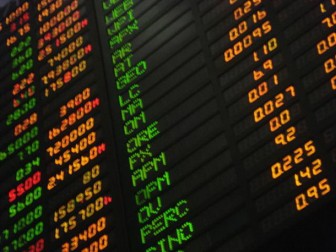 By Chikako Mogi
By Chikako Mogi
TOKYO (Reuters) – Asian shares extended gains for a seventh day on Thursday, after the U.S. Federal Reserve took new stimulus steps to bolster the economy, putting the yen under pressure as expectations grow for more aggressive easing from the Japanese central bank next week.
But while the Fed’s fresh dose of liquidity-pumping measures will underpin sentiment, investors remain concerned about the lack of breakthrough in U.S. budget talks to avert the “fiscal cliff,” some $600 billion of tax hikes and spending cuts scheduled to start in January. A failure to reach a compromise could push the U.S. economy into recession.
U.S. stocks ended little changed on Wednesday, giving up most of the day’s gains after Fed Chairman Ben Bernanke reiterated that monetary policy won’t be enough to offset damage from the fiscal cliff.
MSCI’s broadest index of Asia-Pacific shares outside Japan edged up 0.1 percent to a 16-month peak, having hit successive 16-month highs since December 5.
Australian shares nudged up 0.1 percent, rising for five days in a row, while South Korean shares also edged up 0.1 percent.
“The Fed’s easing measures met the market’s expectations, while the setting of clear inflation and unemployment targets exceeded hopes and will clear uncertainty on the monetary front,” said Kim Yong-goo, an analyst at Samsung Securities.
The U.S. central bank, cut its forecasts for economic growth and inflation next year, committed to monthly purchases of $45 billion in Treasuries on top of the $40 billion per month in mortgage-backed bonds it started buying in September.
But it also took the unprecedented step of indicating interest rates would remain near zero until unemployment falls to at least 6.5 percent.
But uncertainty remained over U.S. budget talks.
U.S. House of Representatives Speaker John Boehner said on Wednesday “serious differences” remain with President Barack Obama in talks to avert the steep tax hikes and budget cuts set for the new year.
Japan’s Nikkei share average opened 1 percent higher to an eight-month peak, as a weak yen continued to lend support.
“The yen depreciation is a big factor for the Japanese equities market,” said Takashi Hiroki, chief strategist at Monex Inc. “The Japanese market will chase the upside. The Nikkei will likely rise to 9,700.”
The dollar was at 83.20 yen, not far from a 8-1/2-month high of 83.30 yen marked on Wednesday.
The Bank of Japan meets next week and is widely expected to further ease monetary policy to support its weak economy.
“Dollar/yen has been moving up for a little while now and you’re seeing the trend continue. It gets moved a fair bit by U.S. yields and those moved up despite what the Fed did, shows you a bit of market positioning,” said Joseph Capurso, a strategist at Commonwealth Bank.
The euro traded at $1.3066, retreating from Wednesday’s high of 1.3098.
Greece’s foreign lenders hailed a bond buyback as a success even though it narrowly fell short of a target to cut the country’s debt, paving the way for Athens to get long-delayed aid to avoid bankruptcy.
In Italy, another debt-straddled euro zone country, Silvio Berlusconi offered on Wednesday to stand back and make way for Mario Monti as Italy’s next leader if the outgoing technocrat premier agreed to run as the candidate for a centre-right coalition.
Monti last week announced that he planned to resign, but European leaders and investors want him to continue his austerity policies and are deeply concerned about a return by the scandal-plagued Berlusconi.
U.S. crude futures were down 0.1 percent to $86.73 a barrel, after rising overnight on the Fed stimulus.
Spot gold eased 0.2 percent to $1,708.61 an ounce. Gold rose on Wednesday as the Fed’s fresh easing measures boosted bullion’s inflation-hedge appeal.
(Additional reporting by Somang Yang in Seoul, Dominic Lau in Tokyo and Ian Chua in Sydney; Editing by Michael Perry)
Source: Reuters




























